Dune 4K Blu-ray Movie
HomeDune 4K Blu-ray Movie 
Limited Edition / 4K Ultra HD + Blu-rayArrow | 1984 | 137 min | Rated PG-13 | Aug 31, 2021
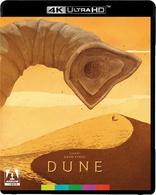
Movie rating
6.7 | / 10 |
Blu-ray rating
| Users | 4.5 | |
| Reviewer | 4.5 | |
| Overall | 4.5 |
Overview
Dune 4K (1984)
A Duke's son leads desert warriors against the galactic emperor and his father's evil nemesis when they assassinate his father and free their desert world from the emperor's rule.
Starring: Kyle MacLachlan, Sting, Kenneth McMillan, Francesca Annis, Sean YoungNarrator: William Phipps
Director: David Lynch
| Sci-Fi | Uncertain |
| Epic | Uncertain |
| Action | Uncertain |
| Fantasy | Uncertain |
| Adventure | Uncertain |
Specifications
Video
Video codec: HEVC / H.265
Video resolution: 4K (2160p)
Aspect ratio: 2.35:1
Original aspect ratio: 2.39:1
Audio
English: DTS-HD Master Audio 5.1 (48kHz, 24-bit)
English: DTS-HD Master Audio 2.0 (48kHz, 24-bit)
Subtitles
English SDH
Discs
Blu-ray Disc
Two-disc set (2 BDs)
4K Ultra HD
Playback
Region A (B, C untested)
Review
Rating summary
| Movie | 4.0 | |
| Video | 4.5 | |
| Audio | 5.0 | |
| Extras | 5.0 | |
| Overall | 4.5 |
Dune 4K Blu-ray Movie Review
Reviewed by Jeffrey Kauffman September 6, 2021 Note: A new version of Dune is just starting to be premiered as this
review is going live, and it will of course almost automatically be compared to David Lynch's prior film version. That version of Dune
received a
previous release on Blu-ray from Universal Studios, and I reviewed it over a decade ago (!).
This review therefore repeats some of the same general content from my original Dune Blu-ray review . Technical assessments and descriptions of supplements related to this release are
of course new to this
review.
High school intellectuals like thick books. Carrying around a several pound tome, especially if itís a dog-eared paperback, lends a certain brainy
ambience to even the geekiest student. In my day, there were two camps of book carriers: the rational, Apollonian types who invariably foisted
Ayn Randís Atlas Shrugged toward any unsuspecting soul who ventured their way, and the more emotionally constructed, perhaps
Dionysian, types, who tended to hoist Frank Herbertís Dune from class to class. One might assume that all the Rand readers were Young
Republicans, indoctrinating themselves in a Greenspanian universe of self interest and, frankly, a good dose of narcissism, while the followers of
Herbert might be expected to grow up to join groups like Move On and watch MSNBC. In my case at least, that couldnít be further from the ultra-
liberal truth, though I even upped the ante by marrying my Rand volume with The Viking Portable Nietzsche. (No, I didnít have
much of a social life, as you might have guessed). And so, being at least a putative Randian in those days, my introduction to the labyrinthine
world of Herbertís Dune came mostly via discussions with ardent fans of the series, who gave me at least a general sense of the outline of
the initial book and its sequels. Obviously a quasi-mystical treatise with thinly veiled allegories relating to any number of Earthly religious
traditions, Dune was a large, lumbering book that, at least in my experience, tended to divide even its most ardent supporters. Some
simply insisted the book was a sort of Second Coming in and of itself, a messianic work of sheer genius. Others who undeniably loved the book
were a bit more open in discussing what they perceived as some of its flaws, including an overly complex plot and a somewhat less than completely
captivating writing style, at least at times.
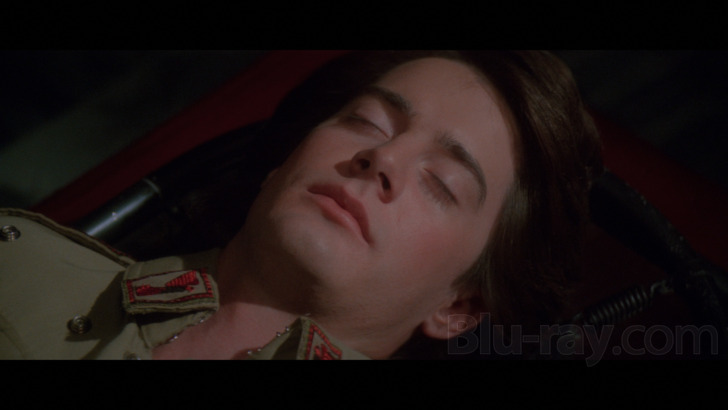
And so itís little wonder that adapting the novel to film caused a whole string of producers and directors well over a decade of fits before it finally landed in the lap of perhaps the most unlikely name ever associated with the property as it slowly roasted in the fires of development hell: David Lynch. Lynch had become a cause celŤbre after having directed Eraserhead and then at least partially erupting into the mainstream with his film version of The Elephant Man. His quasi-hallucinogenic approach seemed at first glance anyway to meld well with Herbertís impressionistic universe where the ďspiceĒ (think drug) mťlange expands consciousness and is the most sought after element on the desert planet of Arrakis. But as anyone who has attempted to glean some sense from Eraserhead or Twin Peaks will tell you, Lynch is not always the model of clarity when it comes to plot and character, and might even be accused of certain excesses more than a little bit, so some wiser heads even in those days before the film attained its rather notorious reputation may have wondered if this particular director actually was the best choice to bring such a sprawling source novel to the screen.
The fact is, despite Lynchís aversion to the finished project, Dune the film is not as horrible as any number of respected reviewers have insisted (nor is it the classic that such iconic figures as Harlan Ellison have argued through the years). Like the novel itself, the film is problematic and was perhaps too large for its format (the 2000 miniseries at least had the time and space, no pun intended, to attempt to delve in the bookís many characters and subplots, which the feature film simply didnít). That said, itís an often riveting recreation of one of the more unique fictional universes ever put on film. It retains a positively Lynchian vision, despite the directorís insistence that the final version barely resembles what he intended, and it is full of some very appealing performances, from then new star Kyle McLachlan to a whole host of stellar supporting players, including Virginia Madsen, Brad Dourif, Max Von Sydow, Linda Hunt, Sting, Patrick Stewart and Sian Phillips.
Itís rather interesting to compare Duneís fate with a little film that came a few years earlier. Perhaps youíve heard of it, I believe it was called Star Wars or something like that. If Lucasí film exulted in its own comic book, Good versus Evil ethos, recreating a sort of Saturday serial Buck Rogers universe, it still posited a cut and dried, white hats against black hats situation that is more or less at the core of Dune as well. The problem with Dune, both the film as well as perhaps the book itself, is it is so relentlessly serious, even operatic, in its ambitions that the pure fun of entering an alternate universe all but disappears in a cloud of dust and sand.
Dune concerns the messianic figure of one Paul Atreides (McLachlan in his first major role), heir apparent to the ďgood guyĒ royal family headed by Paulís father, Duke Leo Atreides (JŁrgen Prochnow). The Atreides clan is up against an Evil Emperor (sound familiar?) named Shaddam Corrino (Josť Ferrer, in his best scenery chewing mode), who plots to not only corner the spice market but attain complete power over the universe (do Evil Emperors do anything else?). He hatches an elaborate plot to give control of Arrakis, the only source of spice in the galaxy, to the Atreides, but secretly sets up a showdown with the Atreidesí arch-enemies, the Harkonnens. That, in a nutshell, is what Dune is all about, but thatís somewhat akin to saying War and Peace is about Russia, or, indeed, that Atlas Shrugged is about some missing guy named John Galt. Herbertís novel is a laboriously constructed piece that literally creates a whole new universe populated by a variety of interesting characters. Part of the fault that can undeniably be found with the film is its attempt to oversimplify things and retain focus on Paul and his attempts to mount a Jedi like revolt against the powers that be. Unfortunately, that very oversimplification ironically works against the film, leaving large swaths of it virtually incoherent to anyone not at least passingly familiar with Herbertís work.
Part of the problem with Lynchís screenplay is probably due to a reaction to the fear of the film being incomprehensible to neophytes, leading to an overcompensation with its perhaps understandable emphasis on exposition, which begins literally right off the bat with Virginia Madsenís introduction delivered fully frontal, so to speak, right to the audience. But the film is filled with Strange Interlude moments where we hear various charactersí inner thoughts, as if to give us some filmic intimation of an omniscient narratorís overview in a novel. It unfortunately does not translate well to the screen, and even ostensibly straight dialogue segments seem to be constructed in order to give us at least a clue about the crazy and convoluted world of Herbertís original creation.
What weíre left with then is an often visually arresting production with some standout performances built around a histrionic plot that may leave more than a few people dissolved in a puddle of helpless giggles. Lynch mounts it all with a fair degree of directorial flair, bringing the arid wasteland of Arrakis virtually palpably to the screen. As didactic as his screenplay often is, directorially heís more at home with ambiguity and a less prosaic approach, letting misty and dusty shots lend an aura of uncertainty to the proceedings. McLachlan is largely quite effective in his first film role, essaying the slow metamorphosis of Paul from a starry-eyed youth to a gritty and determined freedom fighter. The supporting cast is full of some wonderful turns as well, including Sting as a kind of futuristic malevolent punk.
There was probably no way a novel as gargantuan as Dune could have been condensed effectively into a roughly two hour and thirty minute film experience. In fact, even the much longer miniseries which came a decade and a half later probably wasnít completely satisfactory to longtime fans of Herbertís creation, though it at least had the luxury of time to develop plot and characters. If Dune is sometimes messy, and often too portentous for its own good, itís also sort of the anti-Star Wars, that is, a film which revels in its own serious intent and purposes and rightly or wrongly makes no apologies for that Łber-dramatic tone.
Dune 4K Blu-ray Movie, Video Quality 
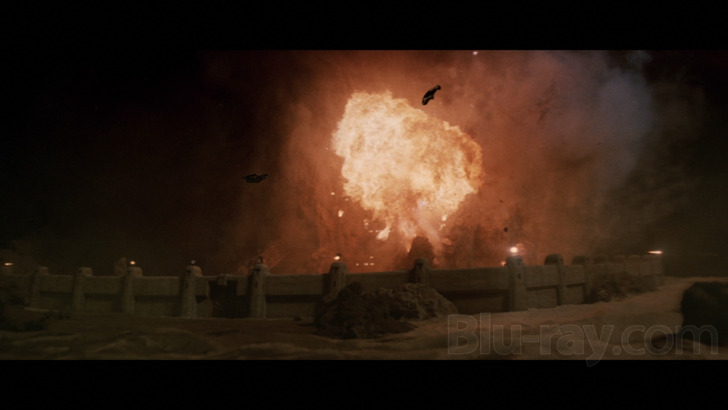
Note: Screenshots are sourced from Arrow's 1080 release of
Dune. Per Arrow's recent standard operating procedure, this 4K UHD release does not include a 1080 version of the feature
film.
Dune is presented in 4K UHD courtesy of Arrow Video with a 2160p transfer in 2.35:1. Arrow's generously appointed insert
booklet contains the following information on the restoration:
Dune has been exclusively restored by Koch Films and is presented in its original aspect ratio of 2.35:1 with 5.1 and stereo sound.Aside from the fact that this information may lead some to have at least a couple more questions (meticulously re-conformed? Lionsgate?), those opting for this 4K UHD version of the film should be generally well pleased. Many of the pluses of Arrow's release which I discuss in our Dune Blu-ray review are repeated here, and fine detail on things like the often baroque costumes and props enjoy a noticeable uptick in this version. Perhaps surprisingly (at least it was to me), HDR and/or Dolby Vision don't significantly alter the overall color temperature, which still struck me as somewhat cooler looking than the now long ago Universal 1080 release. That said, this 4K UHD version offered somewhat less ruddy and purplish looking flesh tones at times than Arrow's 1080 version. Some isolated uses of color, notably the glowing blue eyes several characters sport, pop exceedingly well. The seams of the old school composited effects probably don't benefit from the increased resolution, and grain can definitely spike at times more noticeably in this version than on Arrow's 1080 version. You'll notice it right off the bat in the opening vignettes with Virginia Madsen, but some yellow chunkiness can recur at various moments, especially in some of the darker scenes that start cropping up at around the hour and a half mark. Still, this is generally a very nicely organic looking presentation that should please most fans.
The original 35mm camera negative was scanned in 4K resolution at Technicolor, Hollywood, USA. The film was graded at Uberproductions, Stuttgart and LSP Medien, Uelzen.
The a/b negative was meticulously re-conformed to reference elements provided by Lionsgate Entertainment and Universal Pictures.
All conforming and restoration work was completed in 4K at LSP Medien, Uelzen.
Dune 4K Blu-ray Movie, Audio Quality 
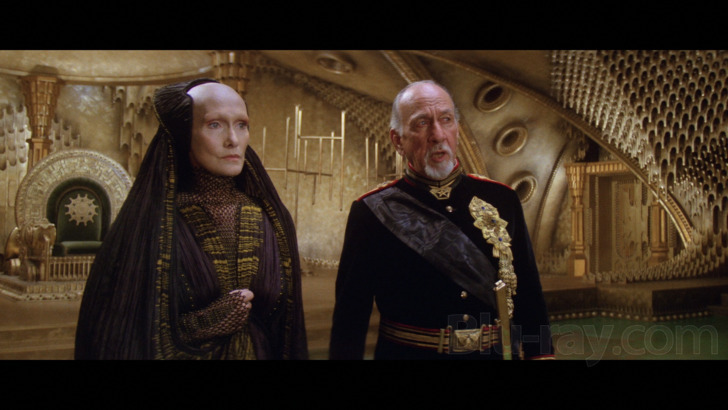
Arrow's version of Dune offers DTS-HD Master Audio 5.1 and DTS-HD Master Audio 2.0 tracks, and I can't imagine most audiophiles not opting for the surround track, which to my ears was at least extremely similar if not outright identical to the track on the Universal version. I'll therefore repeat some of what I mentioned in my original Dune Blu-ray review. The 5.1 track kicks into LFE heaven from the first moments and rarely lets up for more than two hours. This is one of the most bass heavy tracks in recent memory, full of thundering low frequencies that will leave your floorboards vibrating in ecstasy. Directionality and surround activity are also top notch throughout this effort. The opening palace scene with Ferrer and Madsen is a great example, with a beautiful hall ambience filling the surround channels and various groups of people clearly and perfectly directional as they move about the scene. All of the wonderful foley effects fill the soundfield with a wide array of aural pleasures, not the least of which are the omnipresent wind effects on Arrakis, which whip and pan from channel to channel like an out of control cyclone. Dialogue is always clear and precise, though, while directional, is uniformly anchored to the front channels, at least insofar as the main characters are concerned. I'm less fond of Toto's synth-laden score, but it's reproduced here with excellent fidelity. The entire track has incredible dynamic range, even with its omnipresent emphasis on lower frequencies. Optional English subtitles are available.
Dune 4K Blu-ray Movie, Special Features and Extras 
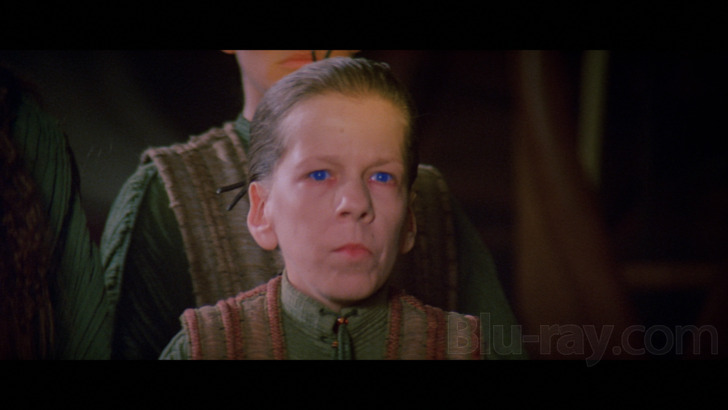
Disc One - Feature Film
- Audio Commentaries
- Commentary by Paul M. Sammon
- Commentary by Mike White
- Impressions of Dune (HD; 39:39) is a 2003 documentary with a ton of interesting interviews, including Kyle MacLachlan, Raffaella de Laurentiis, and Freddie Francis.
- Designing Dune (HD; 8:55) is from 2005 and focuses on production designer Anthony Masters' contributions to the film.
- Dune FX (HD; 6:01) is another 2005 piece that looks at special effects.
- Dune Models and Miniatures (HD; 7:03) also comes from 2005 and looks specifically at model effects.
- Dune Costumes (HD; 4:50) is also from 2005 and features interviews with a variety of crew members involved in costuming the film.
- Deleted Scenes with Introduction by Raffaella de Laurentiis (HD; 2:52 for the intro, 14:21 for the deleted scenes)
- Destination Dune (HD; 6:16) reaches way back into the archives with a 1983 featurette directed by Paul M. Sammon that was produced to promote the film at conventions and other PR events in preparation for its initial theatrical release.
- Trailers and TV Spots
- Theatrical Trailer 1 (HD; 3:09)
- Theatrical Trailer 2 (HD; 1:31)
- US TV Spots (HD; 1:37)
- VHS Promo (HD; 00:37)
- Image Galleries
- Production Stills (HD; 56:03)
- Behind the Scenes (HD; 14:20)
- Cast Portraits (HD; 43:42)
- Production Design (HD; 34:12)
- Poster & Video Art (HD; 8:20)
- Beyond Imagination - Merchandising Dune (HD; 22:37) is a wonderfully entertaining piece highlighting Brian Stillman's fascination with the fact that some marketing mavens thought that Dune was the perfect opportunity to make tie in toys and other items aimed at children.
- Prophecy Fulfilled: Scoring Dune (HD; 24:52) offers film music historian Tim Greiving discussing the film's score, augmented (no music theory pun intended) by audio interviews with Toto members Steve Lukather and Steve Porcaro. For those unaware of how some members of Toto were the scions of notable Los Angeles industry music figures, this piece offers some good background information.
- Additional Interviews
- Giannetto de Rossi (HD; 17:20) was a make-up artist on the film and doesn't shirk from blaming Dino de Laurentiis for "ruining" the film. In Italian with English subtitles.
- Golda Offenheim (HD; 26:16) was the Production Coordinator, and is a wonderfully engaging interview subject, as she discusses being what amounts to basically the "nanny" for the cast and crew.
- Paul Smith (HD; 8:50), who died in 2012, played Rabban in the film, and this archival interview is culled from a supplement that was included on Pieces (the link points to the Region B release from Arrow which I reviewed, though there's also a Region A release available from Grindhouse).
- Christopher Tucker (HD; 3:02) did special make-up effects and offers a few brief comments here, since a lot of his work was evidently excised from the final version of the film.
Dune 4K Blu-ray Movie, Overall Score and Recommendation 
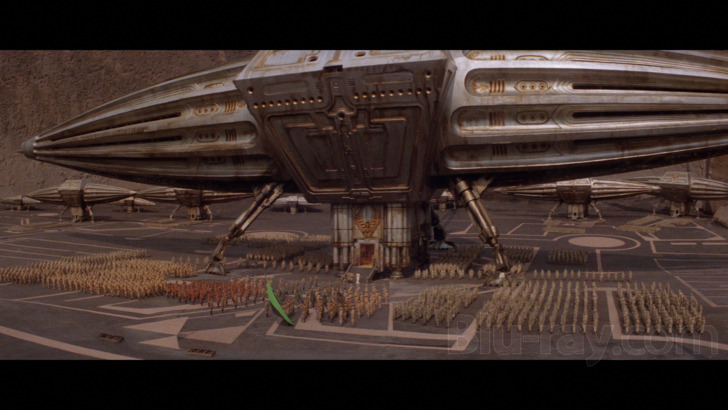
Dune is a film that can be as dry as a long walk through the Sahara. But there's also quite a bit of visual bombast here which patient viewers can see as their personal oases. McLachlan and the rest of the cast do as well as can be expected with an often pretentious screenplay, but Lynch's very unique visual style, as nascent as it was back in the mid-80's, is still fully on display here, lending the film a certain sweep and romance. It's serious, yes, but that's not necessarily a bad thing. With the new version of Dune unspooling at this very moment, it might be a fun exercise for fans to check out this new Arrow release in tandem with Jodorowsky's Dune before venturing to the local cineplex to see if three's the charm. This Arrow 4K UHD release sports solid technical merits and Arrow's typically nice array of supplemental material and handsome packaging. Recommended.
Other editions
Dune: Other Editions

Dune
1984

Dune
with Warcraft Fandango Cash
1984

Dune
Limited Edition
1984

Dune 4K
Limited Edition
1984

Dune 4K
Limited Deluxe Edition
1984

Dune 4K
Standard Edition
1984

Dune
Special Edition
1984

Dune 4K
Special Edition
1984

Dune
Australian Import
1984

Dune 4K
Limited Edition | + Sleeper Must Awaken docu & Extended Version BDs / Import
1984
Similar titles
Similar titles you might also like

Star Wars: Episode IV - A New Hope 4K
1977

Star Wars: Episode I - The Phantom Menace 4K
1999

Star Wars: Episode III - Revenge of the Sith 4K
2005

Star Trek: The Complete Original Series
1966-1969

Stargate
Extended Cut
1994

Valerian and the City of a Thousand Planets
2017

Doctor Who: Complete Series 1-4
2005-2008

Star Trek 4K
2009

Star Trek Beyond
Bonus Disc / Exclusive Packaging / Character Cards
2016

Ender's Game
2013

Jupiter Ascending
2015

Star Wars: Episode VI - Return of the Jedi 4K
1983

Star Wars: Episode II - Attack of the Clones 4K
2002

Star Wars: Episode VIII - The Last Jedi 4K
Ultimate Collector's Edition
2017

Star Wars: Episode VII - The Force Awakens 4K
2015

Star Trek: Picard - The Complete Series
2020-2023

Star Wars: Episode IX - The Rise of Skywalker 4K
Ultimate Collector's Edition
2019

Star Trek II: The Wrath of Khan 4K
1982

Star Trek III: The Search for Spock 4K
1984

Star Trek IV: The Voyage Home 4K
1986